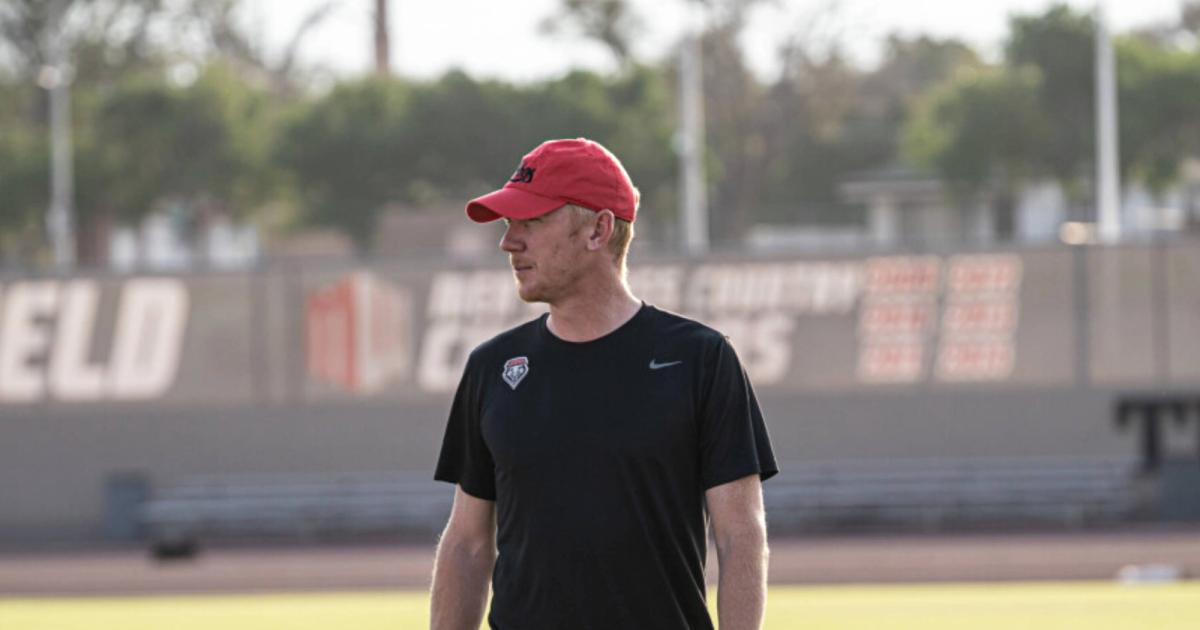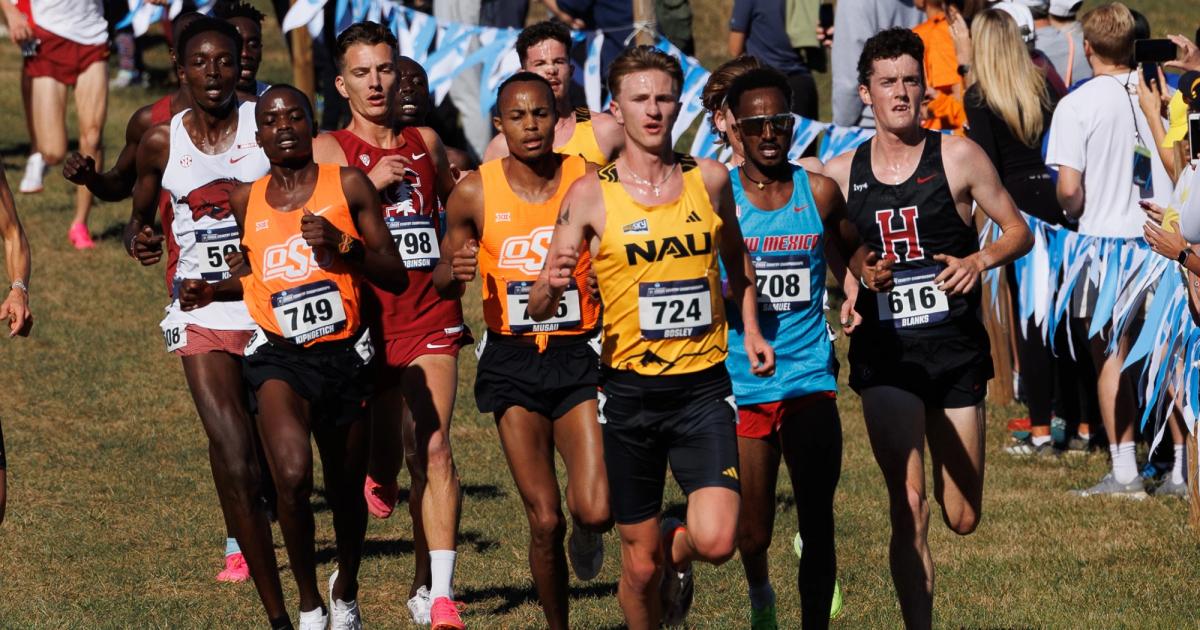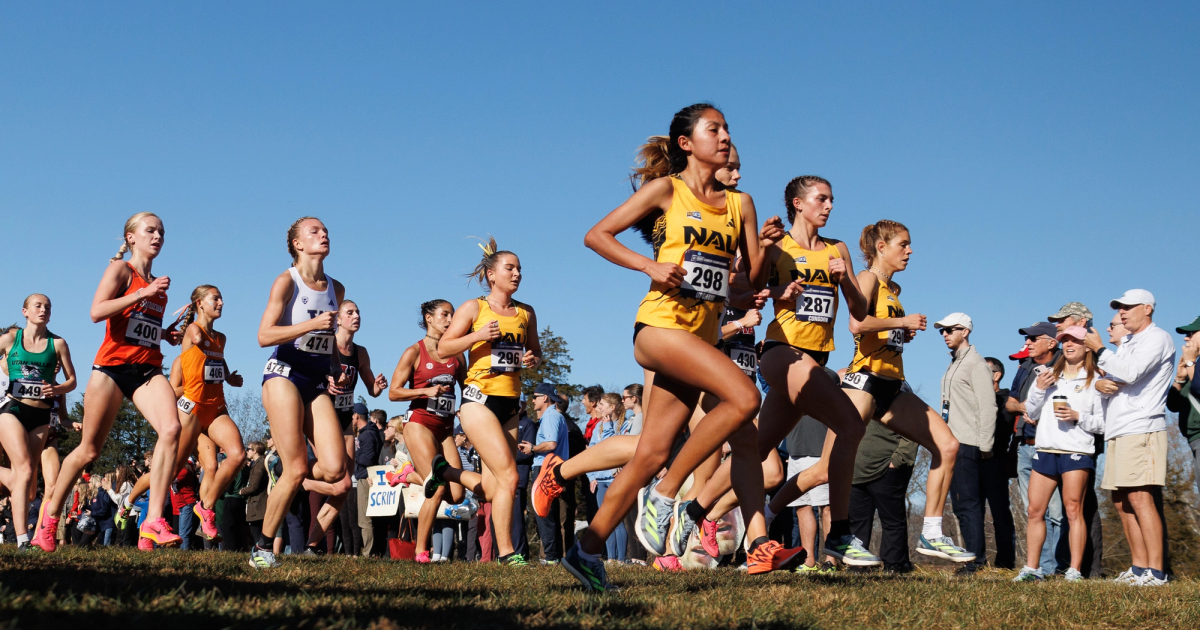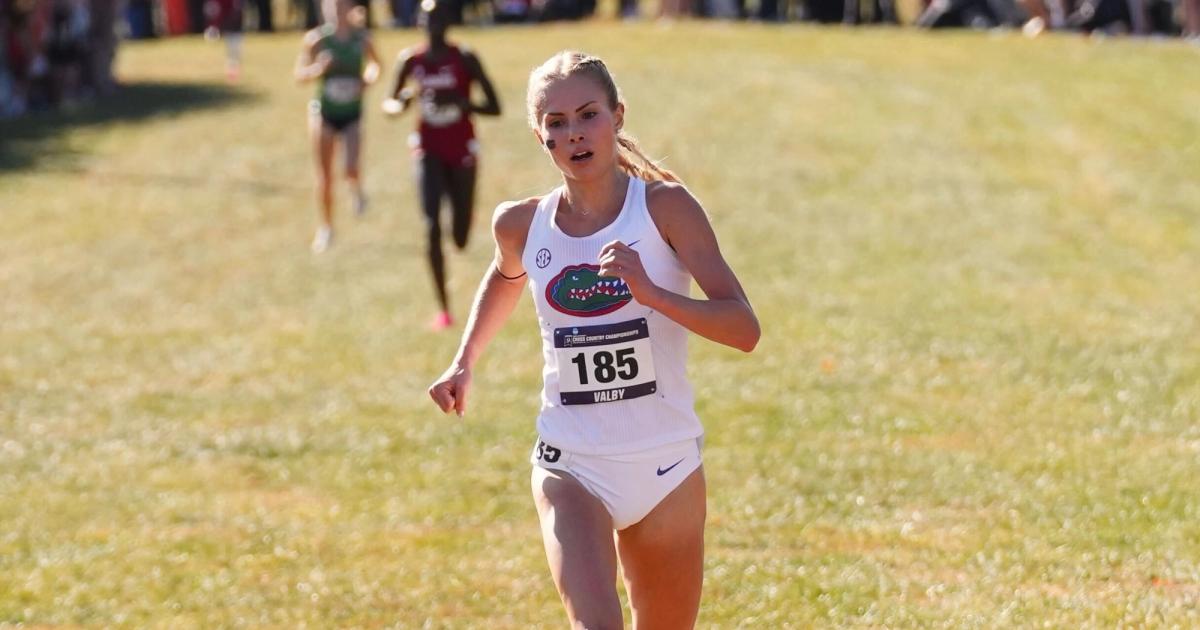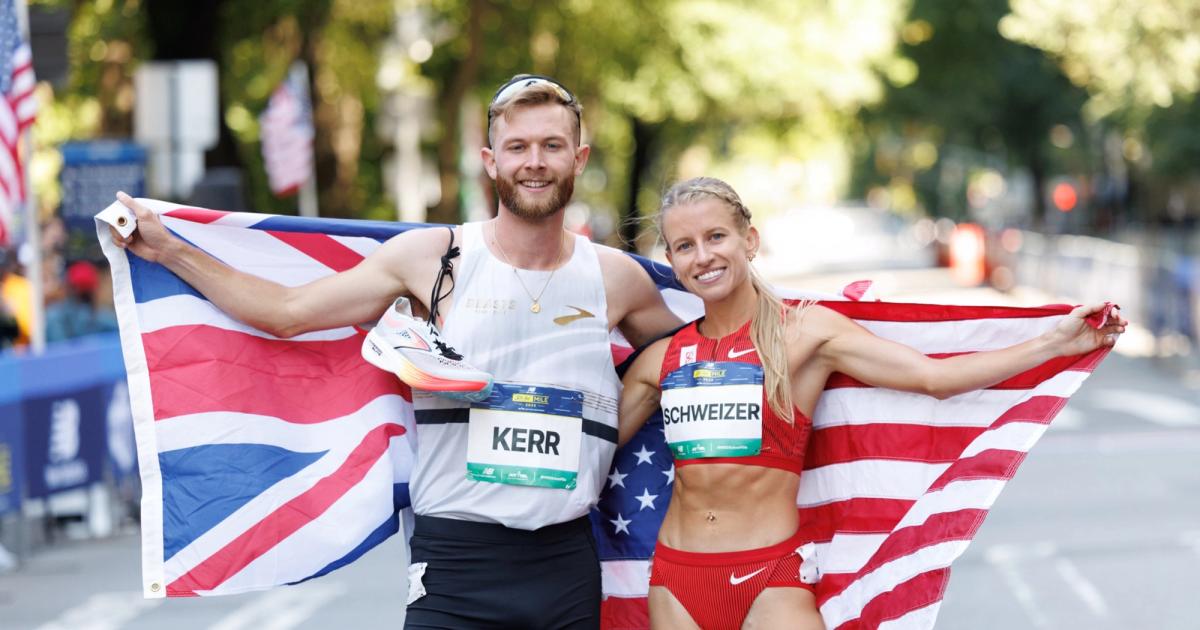By Jasmine Fehr
September 17, 2024
With the NCAA cross country season underway, Jasmine Fehr is catching up with some of the top coaches to showcase their programs, explore their insights, and pitch their teams to new fans as the championship season approaches.
For our first feature, she spoke with Darren Gauson, Head Coach of Cross Country and Track & Field at the University of New Mexico, to hear about how he’s continuing to rebuild the program after his successful first year with the Lobos.
The following interview excerpt with Darren Gauson has been edited lightly for length and clarity.
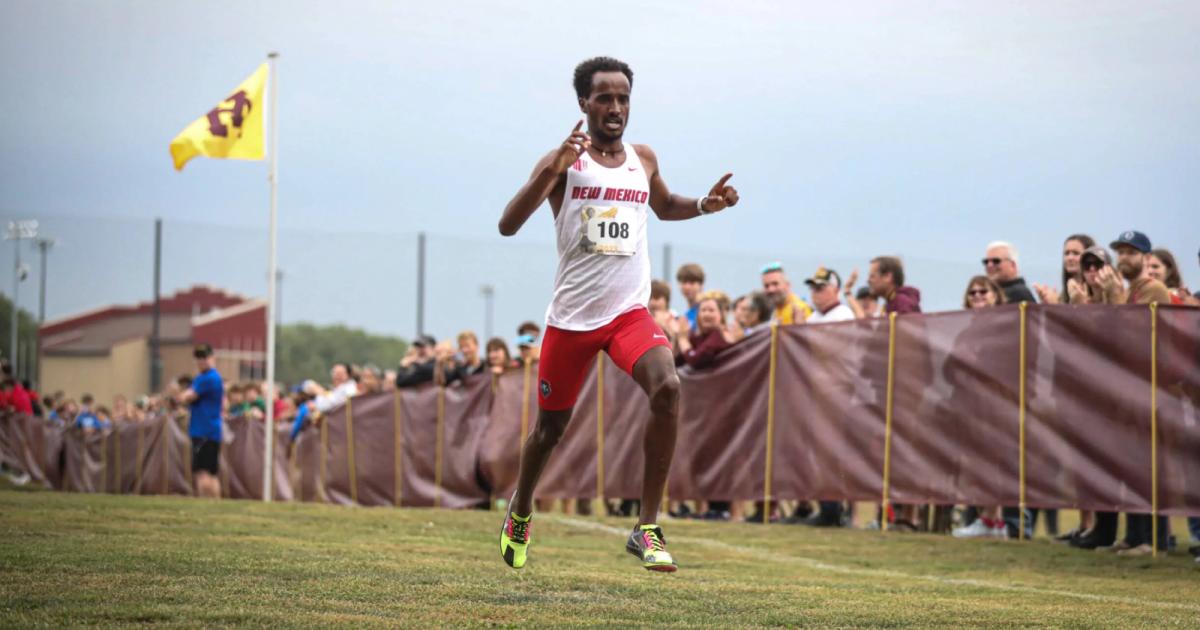
Photo Credit | University of New Mexico Athletics
CITIUS MAG: You're starting your second year as Head Coach of Track and Cross Country at New Mexico. Your first year was a huge success: the men qualified for NCAAs for the first time in 14 years, where Habtom Samuel finished runner-up and the team finished 18th. Habtom also won the outdoor 10,000m. Going into this season, what are you most excited about and what sets your team apart?
Darren Gauson: Before I got here, Coach Franklin’s team was sixth in the conference and hadn't made the meet for a number of years. We were able to bring in a few athletes with Thomas Termote, Lukas Kiprop, Evans Kiplagat, and obviously Habtom as a freshman and launched straight into 18th in year one.
We were hoping for a little bit more. I think we were sitting in tenth and then Lukas had a little bit of a knee problem. He was up there at the regional meet and did pretty well all year and then fell back quite a lot into the hundreds which really killed our team score.
The team is a lot stronger. We added Vincent Chirchir in January. He’s a 13:34 guy, low 28:00s. We added Iker Sanchez from Arizona, a top athlete from Mexico who went to World Juniors and he's doing an outstanding job at the moment. And then Rikus Van Niekerk from CBU was their number two or three all year. He also is way ahead of where we thought he was going to be. I think the sky's the limit on the men's side.
We added one more, he just arrived a week ago: Collins Kiprotich. We're looking really good on the men's side. Habtom is in incredible shape. I mean, 26:53 was an amazing 10,000m performance, but that was the week after indoor nationals. He is really looking to lead this team to our second Mountain West championship and then see what we can do on the national stage.
CITIUS MAG: How would you describe your coaching philosophy and how has it evolved over the years?
Darren Gauson: I was at Lamar for three years in Beaumont, Texas. Had some great teams there, finished third in the region a couple of times. Bradley was easier from a weather standpoint. We could do some longer threshold runs and were able to get the men's team to the national championship and finished second in the region, which was incredible. But back then I was just doing a lot of long 10-mile tempos, long threshold runs, and a lot of aerobic work during the season.
But the championship has changed so much. You look at this past year in Virginia; 2:29 for the first 1K is crazy. So unless you're doing some speed and some turnover stuff during the year, it's really hard. Unless you've just got a bunch of 3:30-something guys on your team that can handle that first mile, it's hard to compete.
Now we do three different blocks. Our first six-week block is very aerobic, pretty short recovery, and not too much turnover. We'll still do our 200m strides at the track once or twice a week. But now the last few years we've been doing a lot more on the track, doing some 300s, some different pyramid-type workouts we would do during the track season. So just trying to prepare them a little bit more for the intensity – it's like a track race nowadays. You're trying to be in low 13:00s and low 27:00s shape when Wisconsin rolls around…
In the middle of the season we’ll do 4 x 300m, then we'll jump into 800m repeats, then we'll finish with 4 x 300m at like 43, 44, 45. So simulating the start of the race, the middle part and then the end of the race. We'll try to hit a different stimulus once we get to that second phase of training. And obviously we've got the huge added benefit of being at 5,000 feet. A lot of those easy runs benefit us a little bit more being up here compared to the sea-level schools.
CITIUS MAG: Touching more on the mental side of things, how do you prepare your athletes for the challenges of competing and training and making sure that everyone stays locked in for the season?
Darren Gauson: Every athlete's totally different. You got guys like Habtom Samuels – an NCAA championship is a huge deal for them, but they're able to process it fairly quickly. They've been on that scene.
And then you have some freshman guys or women where you've really got to let them know what it's going to be like and settle their nerves and make sure they're prepared to compete against some of these athletes. And it's just the mental aspect of the day-to-day training: managing the workouts, managing the academics. We've got a lot of international athletes on our team, so managing being away from home, being away from loved ones and how they navigate that throughout the season.
There's a lot that goes into that and it’s one of the beauties of being here. We have a staff of four with Coach Maty, Coach Berryman, and our new addition, Coach Schwartz. We've got an amazing staff and people that have run at different levels and coached at different levels.
And some people are totally different. Before I got on this call, I was talking to Habtom about a math class. Or I’m talking to some other athletes about getting them a phone. It might be like practice is fine, but other things can weigh on them and affect their sleep. And it just varies from person to person. It's a real family feel on our team and everyone's helping each other out. Our culture is really strong this year.
CITIUS MAG: That's actually one of the questions I wanted to ask you about: how do you go about creating a strong team culture? What are the most important factors in building that and what do you value as a coach in building a program?
Darren Gauson: I'm big on team and I'm big on accountability. If you're the number one or you're new to our team, it's going to be the same for everybody. And we're just trying to have everyone on the same page with our philosophy. We're very open with recruiting: ‘Hey, this is what we do in training. This is how we coach people.’ There are a lot of individual parts to everybody and we're going to tweak training if they're coming in at 20 miles a week versus 80 miles a week. But we always want to be on the same page as a staff and our student-athletes so they know what the expectations are.
We're big on time management. I always say a minute late is the same as an hour late, so everyone's on time. Everyone's dialed across the team and we're all doing our activation together. We're all doing our core together as a team. So just trying to create that culture of excellence. Then when you have people eventually graduate, the people behind are going to learn from them and know what we're doing and then move up into those positions. And I think you've seen that this year. We had a lot of women working really hard and doing an awesome job and they have come back super fit. The women's team missed the meet last year and we're looking really strong on the women's side.
On the men's side we were really strong through three, and then there were some gaps. Thomas Termote was a 31-minute guy over 10,000m and didn't help us out too much during cross country last year. But then he ran 28:58 and developed massively just learning from some of those guys on the team.
We'll rotate some things too. Last week after the long run, we took all our women to brunch. This Sunday, we're taking all the men to brunch after the long run. And we'll do some of the little things to create unity and camaraderie on our team and make sure everyone's on the same page. We're not trying to have six different practices. We want everyone together, training together, learning from each other. I really love where we're at.
As a whole program, we did 150 official visits in our track and field program and we brought in 47 athletes to our team this year. When I got the job, we only had five women left on the team. So my staff had a lot of work to do. And just finding individuals… Yeah, they're great runners, but are they going to be fit to be coached by me? Are they going to be a fit for Coach Maty, Coach Berryman, and Coach Schwartz?
I think that's important when you're out there recruiting and we're really open and upfront with what we are, what New Mexico is, what Albuquerque is, what our team's all about. We really love where we are at the moment. We just want to keep elevating our program.
When I took the job, it was like: Coach Franklin had two national championships. I walk into the office and see those two trophies. That's the level of expectation. We're trying to create the culture and the tone where it's something that we can replicate every single year.
CITIUS MAG: I love that! When you have freshmen and developing athletes going to practice every day seeing firsthand what Habtom’s doing, what these elite-level runners are doing, it gives them a role model and a framework to follow.
Darren Gauson: I think we really see that. There's not really any egos on our team. Especially when it comes to cross country. When you go back and look at the results, you might know that Parker Valby won on the women's side, but who finished 16th on the women's side? I don't know. But you know where the team scores were, so it's not about an individual. It's not about who's two or three.
It's about how we do as a team and where we fill in the gaps and how we win some other battles out there on the course and where our team is going to finish. I think that's what's really important to cross country running. It's a little different in track, it’s a little more individual, but we try and make it as team-like as possible even in the track season.
CITIUS MAG: Reflecting on your own coaching career, do you have a favorite meet, practice, or moment with the team that you want to share?
Darren Gauson: An obvious one in my career was qualifying Bradley to a national championship. We were hosting the regional championship in Peoria, Illinois. And I said, in five years, ‘I'm going to redshirt some guys and we're going to qualify for nationals.’ In my fourth year, we were hosting regionals and we had some adversity throughout the year. The men's team finished second, beat Oklahoma State behind Iowa State and qualified for nationals. That was a really fun day: for one, we were hosting, and two, to qualify and get 24th. So that was a great memory for me at Bradley.
Here at New Mexico, it's got to be the [2023] conference meet for us. I wouldn't say we were strong favorites and we won by two points and beat Air Force. Ryan Cole is an incredible coach. And for us to come in and win in year one… we had a great time and it was awesome. My second one probably would be Habtom winning the 10,000m title in Eugene.
CITIUS MAG: Going back to Bradley, that's amazing that you were hosting regionals and ended up qualifying for nationals. That must’ve been an incredible moment with the team.
Darren Gauson: It was crazy. It's funny, Martin Smith from Iowa State was there. I remember him coming up to me at nationals like eight days later, and he was like, ‘I've been doing this for a long time. But that was one of the most incredible atmosphere moments I've seen in cross country.’ That means a lot coming from Martin Smith. I still keep in touch with those seven guys. I've been to a couple of their weddings. It was a really fun experience.
CITIUS MAG: The landscape of NCAA athletics has changed a lot recently. We've seen roster limit caps, scholarship changes, and more developments with NIL deals. How has that changed your approach to coaching?
Darren Gauson: That wasn't a thing in 2018 when we qualified [at Bradley] and it’s definitely harder at smaller schools. It’s a different landscape now. You have people signing with shoe companies. It's having those relationships with agents and shoe companies and then you've got the collectives.
[At New Mexico], we were looking to fill in our team and met with a couple of student-athletes who were in the portal. It wasn't just ‘Can you give me a full scholarship?’ It’s like, ‘What else can you do for me on top of that?’ So it's a different world. But I mean, we're not football or basketball… For us, it's a little more manageable, but it's certainly a completely different landscape over the last three or four years.
Thankfully, being at the University of New Mexico, our interest level is very high. We're at altitude. We've got great athletes. I ran at Butler University 20 years ago. It was definitely a lot different then where there were a few smaller private schools doing really well at national championships. Now it's a lot harder. You see some SEC schools, some Big 12 schools getting their rosters deeper and deeper. I think it’s going to squeeze out some of the smaller schools. At Lamar, we were third twice. We were behind Arkansas and Texas two years in a row on the men's side. Things like that are going to get a lot harder with the new landscape at the NCAA.
CITIUS MAG: To close things out, what do you enjoy most about coaching at New Mexico and how do you hope to continue growing the program?
Darren Gauson: I love the weather: low humidity and there’s not much of a winter either. You can train really well all year round. Another thing I love is that when we’re out at the track in January, February, March, we’ll see Josh Kerr there, Courtney Frerichs there, PUMA there. The Japanese national team was here training all year and three of their guys ran at the Olympics. So when we’re out at the track you're seeing Olympians, World champions. We've got different groups emailing us: ‘Hey, can we use your track at this time or that time?’ Cole Hocker was out at the track before U.S. Indoors.
So that's incredible. The pro scene, the training environment, the trails, the altitude. I remember 25 years ago being in Scotland and reading about Hicham El Guerrouj, Paula Radcliffe, Bernard Lagat, and I’m like, ‘Where's this Albuquerque that these people are training at?’
We use that in recruiting. I think we're growing it really well at the moment. We were talking about culture and doing it the right way and doing it our way. We love where our women's team is at. I think they're going to scare some people this fall. We just want to be the best team we can and just continue to recruit and find people from all over the world, all over the the U.S. to come into our program and make us better, have great team culture and have people who want to go on to be the next Josh Kerr, or the next Courtney Frerichs, or the next Weini Kelati, or the next Adva Cohen. Coach Franklin did an incredible job and has a long list of alumni. We're trying to find that next group to come through our program.
You’ve seen NAU really build on the women's side and now they’re clicking, both men and women. That's our goal. We want to be top 14 for both the men’s and women’s programs every single year. On my whiteboard over there, we’ve got the weeks written down. We’re just excited for every week to come along… Our team is healthy and looking really good at the moment. And you know as every team is, you're always one injury away or one mishap away. It’s going to be a really fun, great year for the Lobos!
CITIUS MAG: Thank you so much for joining us! We’re looking forward to following along the team’s results throughout the season.
___________________
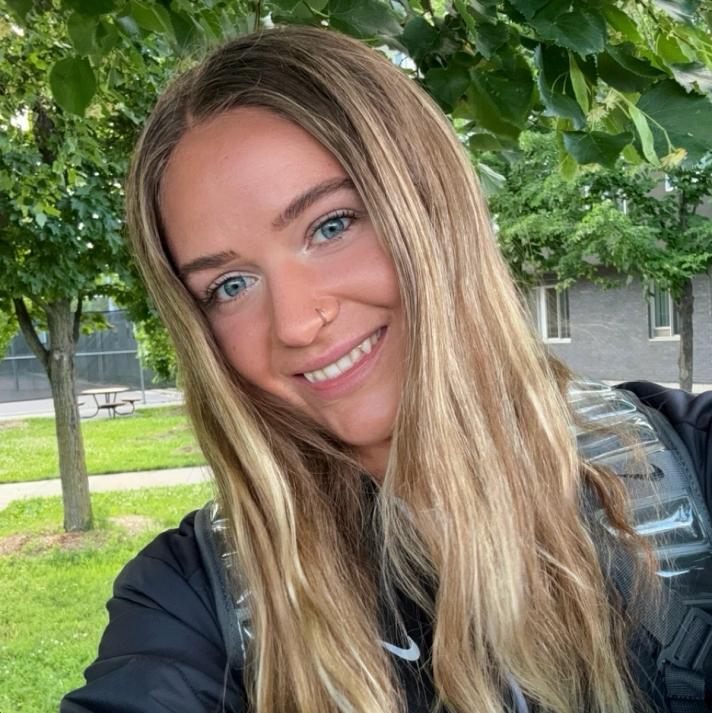
Jasmine Fehr
Jasmine Fehr produces the CITIUS MAG Podcast, manages our website, and shares content across our socials. She’s a marathon runner training in Flagstaff, Arizona. Her collegiate running career spanned the University of Portland and the University of Tennessee, where she earned a Bachelor’s degree in Psychology and Master’s degree in Communications.
